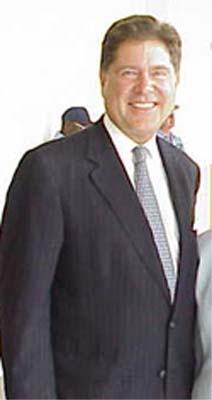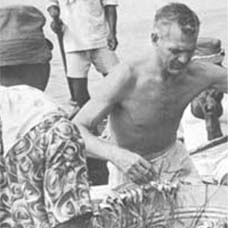
Alberto Ibarguen joined the Peace Corps. He lived in Columbia while training, then in the Amazon jungle in Brazil for a few years
Diverse news staff gives media context
By Tessa Jeffers
J Alumni News staff
When Alberto Ibarguen was asked to speak with University of Nebraska-Lincoln journalism students about diversity, his initial response was, “You want me to talk about what in Nebraska?”
But diversity needs to be addressed virtually everywhere, he said — especially Nebraska, where the Hispanic population is one of the fastest growing groups in the state.
Ibarguen, publisher of The Miami Herald since 1995, has been dealing with issues of diversity his entire life. He was born in Puerto Rico and moved to the United States when he was 8 years old.
After earning the bachelor of arts degree in modern European history from Wesleyan University in Middletown, Conn., Ibarguen joined the Peace Corps. He lived in Columbia while training, then in the Amazon jungle in Brazil for a few years.
“Early on I think I figured out the great value of diversity,” he said.
The Brazilian way of life is very different from that in American, he said. But being immersed in a different culture can be a very rewarding experience.
“It broadens you, and it gives you context,” Ibarguen said.
After he left the Peace Corps, Ibarguen earned a law degree from the University of Pennsylvania. He was a legal aide lawyer for the Puerto Rican Center for Justice and also had his own private practice for 10 years.
His experiences in the world of law contributed to his awareness of differences among people. Many times he dealt with issues of discrimination and equal opportunity.
“I always thought I’d wanted to be a lawyer because I felt the law affected every aspect of life I was interested in,” he said.
He was attracted to the process of quality legal thinking, he said, or the legal analysis that takes the emotion out of an argument and forces one to be ultimately rational.
Journalism is similar to law in this way, Ibarguen said.
In 1960, Miami was only 5 percent Hispanic, similar to what Nebraska is currently, he said.
After Fidel Castro took over in Cuba in 1959, hundreds of Cubans fled to the United States. A huge influx of Cuban immigrants settled in Miami between the mid-1960s and the mid-1980s.
More than a third of The Miami Herald’s readers were Hispanic, creating a strong need for a Spanish newspaper in Miami.
“If I cannot read Spanish, and you make me, you have cheated me on my money,” he said.
He said it was like going to the meat market to buy food and not getting what you demand.
“Why are you forcing me to buy a pound of roast beef when I need bologna?”
The editors of The Herald knew they needed to do something in Spanish. At first it was just a few pages of the paper translated into Spanish. As the Latino population grew, an entire section was devoted to the Spanish community. Eventually that developed into a separate newspaper.
For almost seven years, El Nuevo Herald has been serving the large Hispanic population in Miami as an independent mainstream newspaper. The Miami Herald and El Nuevo Herald have entirely separate staffs.
Martin Baron, news editor of the Boston Globe, worked with Ibarguen at The Miami Herald as editor for a year-and-a-half, starting in January 2000.
“To say you’re covering the Hispanic community in Miami is to say you’re covering the community,” he said.
Baron said the key to covering diversity issues successfully in journalism lies in a diverse staff, language training and awareness.
“The staff needs to get out into the community and have conversations with people,” he said.
However, when doing so, it is important to stick to the facts, Ibarguen said.
“The newspaper’s role is to inform the community and give citizens enough information to manage their community well.”
It needs to be good, reliable and complete up to the extent that it’s humanly possible, he said.
“I’m far less interested in a paper taking sides,” said Ibarguen. “I always tell people to set out for the facts.”
Ibarguen gets frustrated when journalists are compared to or confused with the government. Sometimes citizens see their local newspaper as a political voice. That’s what opinion pages are for, he said.
Will Norton, dean of the College of Journalism and Mass Communications at UNL, contacted Ibarguen and told him he was taking a group of depth reporting students from UNL to Cuba in early January, to report on the situation in that nation.
Ibarguen recommended that the group stop in Miami on the way, so the students could interview Cuban immigrants living in Miami and other locals who might give them another perspective.
Ibarguen arranged a place for the group to stay and also met with the students to discuss their endeavors.
Norton also invited Ibarguen to speak at the Nebraska Press Association’s banquet in Lincoln on April 11.
Coming to Lincoln gave Ibarguen the chance to reunite with the students who had traveled to Cuba.
He said it was an absolute joy to visit with them about their experiences and opinions.
“Mainly, I just enjoyed talking to smart journalists,” he said. “Listening to how well students responded to Cuban people and the culture of Miami and Havana, how open they were and how smart they are — it made me feel good,” he said.
However, Ibarguen said some of the feedback he heard was disheartening. The students told stories of being lied to by spies and other citizens of Cuba.
“I’m glad they had that experience but sad. It gave them a real life example of the kind of world these independent journalists (in Cuba) are trying to operate in.”
He asked students what a newspaper meant to them and then told them his views on the subject.
“Journalists need to think about what the underlying narrative of their community is,” he told them.
Lincoln’s about as close to Mexico as the man in the moon is to Mars, he said, but Lincoln also is home to people from many cultures.
Ibarguen, who loves baseball, passed along a piece of advice from Yogi Berra, who once said, “You can observe a lot of stuff just by watching.”
That approach will get you far in journalism, Ibarguen said.
He added that he stops at the same place every morning to get coffee, mostly to visit with local folks and hear what they’re talking about.
“You can hear a lot just by listening,” he said.









